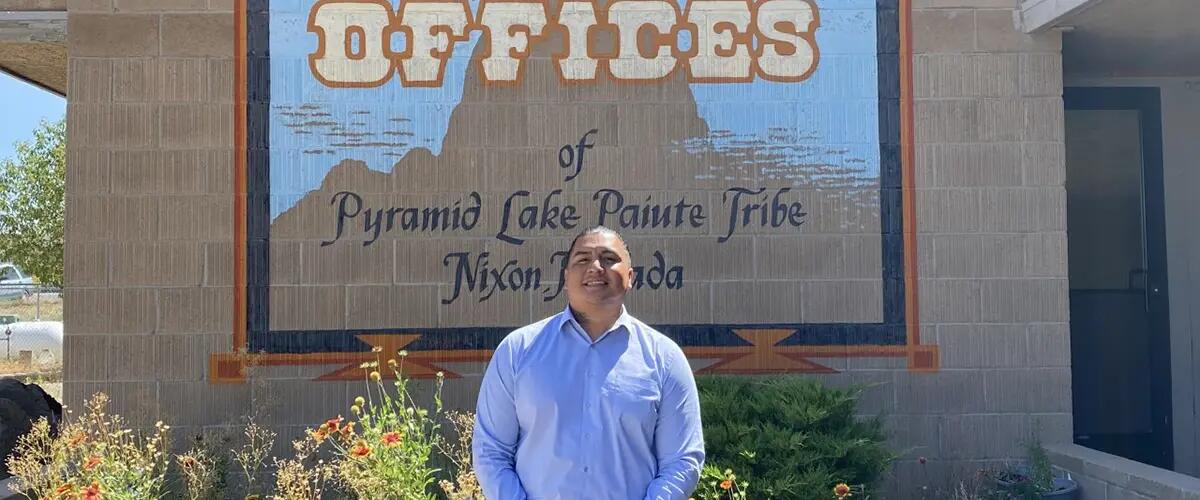
Douglas Williams
Comptroller's decision to earn Master of Governmental Accounting will help his Native American tribe
Pyramid Lake in Nevada is a tourist destination for boating, fishing, and camping — and the financial lifeblood of the Pyramid Lake Paiute Tribe. The lake, located on the tribe’s reservation 35 miles from Reno, “is one of the big revenue generators,” said tribe member Douglas Williams, who manages the tribal government’s finances as comptroller.
Williams landed the tribe’s highest financial position last December, the same month he earned a Master of Accountancy in Governmental Accounting from Rutgers Business School (RBS).
“There’s such a need for this kind of expertise in running Native American tribes,” Williams said. In addition to overseeing roughly $11 million in general operating funds, Williams must ensure the tribe complies with extensive requirements tied to the receipt of $34 million in state and federal grants.
Fewer than half of the 2,800 members of the Paiute Tribe live on the 742-square-mile reservation. The tribe provides typical local government services, including education, garbage collection, police and emergency response, and a judiciary. It also operates a federally funded health clinic, two gas stations and a store. Revenue comes from selling recreation area permits, third-party billing at the clinic, and the businesses, Williams said.
Williams was working in finance for a Native American tribe in Washington State when a supervisor mentioned the online program at Rutgers. Students take a total of 10, 3-credit courses, including seven core classes like governmental accounting, governmental budgeting, and public sector budgeting, and three electives, such as public finance and forensic accounting. No GRE scores are required, and RBS offers the program to all students at the in-state tuition rate.
“I knew this was a huge opportunity to grow and learn,” said Williams, who holds a bachelor’s degree is in tribal governance and business management from Northwest Indian College in Washington. “I knew it would open a lot of doors.”
Williams enrolled in the spring semester of 2019. That summer, he landed a demanding new job as executive officer of the Pyramid Lake Paiute Tribe, a position he held during the first six months of the pandemic. A father of two sons, one born in April 2020, Williams put the master’s degree on hold.
Irfan Bora, director of the Master of Accountancy in Governmental Accounting program, helped Williams get back on track. “Professor Bora worked with me to create a plan to complete the program,” Williams said. “He supported and encouraged me. I was determined and I stuck with that plan.”
Williams said he would wake at 4 a.m. to complete assignments and attend classes virtually on East Coast time before heading to work. The evenings were reserved for family time. Williams completed four classes in the spring of 2021 and the final four last fall.
“The Rutgers Governmental Accounting Program was unique, and for me perfect, because of my work and family demands,” he said.
Williams said he was impressed with the instructors’ knowledge, and he felt he received one-on-one attention even though the program was online. He especially enjoyed the courses in ethics and informational systems.
The tribal leaders and members “simply want to know how the money and resources are being utilized,” Williams said. “I learned so many technical skills which makes it easier to explain the big picture,” he said.
Williams is working to identify opportunities to leverage the tribe’s finances to fund additional services and projects that benefit the community. He said he is investigating investment opportunities to create additional sources of revenue.
Williams said he expects his career will always involve working with Native American governments. “Native American tribes are so deep into culture, and each has different goals.,” he said. “I want to give back to my tribe and others across the nation.”
Next on the 33-year-old’s professional path is preparing for the CPA exam. He said completing the master’s program at Rutgers gave him the confidence and preparation to take the exam.
- Margaret McHugh
Press: For all media inquiries see our Media Kit


